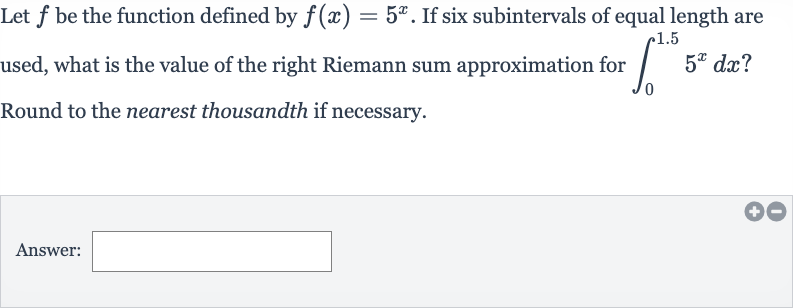Full solution
Q. Let be the function defined by . If six subintervals of equal length are used, what is the value of the right Riemann sum approximation for ? Round to the nearest thousandth if necessary.Answer:
- Divide into Subintervals: To approximate the integral using a right Riemann sum, we first need to divide the interval into six equal subintervals. This means each subinterval will have a length of .
- Calculate Subinterval Length: Calculate the length of each subinterval: .
- Identify Endpoints: Identify the endpoints of each subinterval. Since we are using a right Riemann sum, we will use the right endpoint of each subinterval to evaluate the function. The endpoints are: , , , , , and .
- Evaluate Function at Endpoints: Evaluate the function at each of the right endpoints of the subintervals: , , , , , .
- Calculate Function Values: Calculate the value of the function at each endpoint:,,,,,.
- Calculate Rectangle Areas: Multiply each function value by the length of the subintervals to get the area of each rectangle in the Riemann sum: ,,,,,.
- Add Rectangle Areas: Add up the areas of all rectangles to get the right Riemann sum approximation:Right Riemann Sum = .
- Perform Calculations: Perform the calculations to find the sum: Right Riemann Sum = .
- Use Calculator: Use a calculator to find the numerical values of each term and sum them up:Right Riemann Sum .
- Calculate Numerical Values: Calculate the sum:Right Riemann Sum .
- Calculate Sum: Round the result to the nearest thousandth: Right Riemann Sum .

